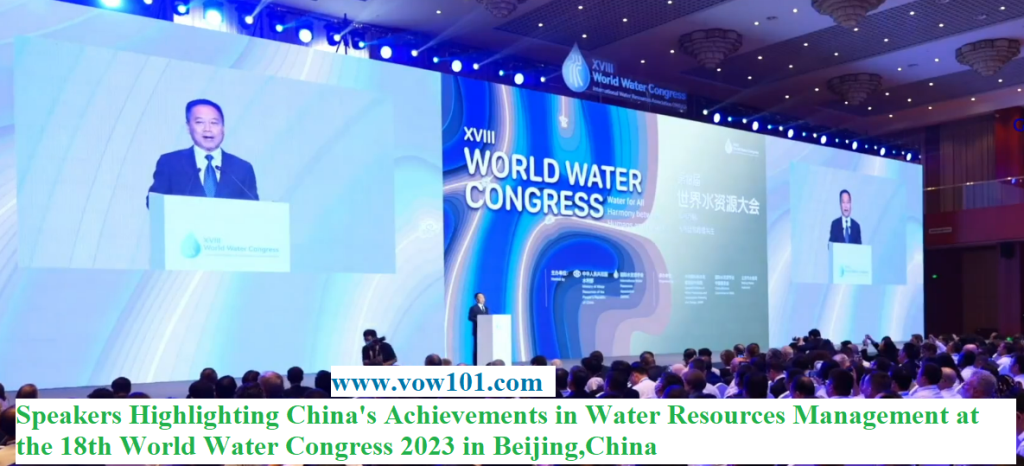China Sets Example of Innovative, Proactive Water Policy: Experts
Speakers highlight China's achievements in water resources management at the 18th World Water Congress18th World Water Congress in Beijing, China
- China makes significant contribution in promoting water security for the benefit of all populations
- “We should respect the right of rivers to survive in nature”: China’s minister of water resources
- 90 percent of the Chinese population has direct access to drinking water
Beijing: “China is an example of innovative and proactive water policy”, these remarks were expressed by the delegates from international organizations while highlighting China’s achievements in water resources management at the 18th World Water Congress being held capital city, Beijing.
China has seen fundamental improvement in the condition of its rivers and lakes in recent years, Li Guoying, Water Resources Minister, said on Monday at the opening ceremony of World Water Congress.

Siddharth Chatterjee, United Nations Resident Coordinator in China, quoted one of the four proposals made by Li Guoying, China’s minister of water resources, at the 2023 UN Water Conference in New York in March in his opening speech to the session.
“We should respect the right of rivers to survive in nature, treat water as living entities, develop river ethics, protect rivers’ healthy life and achieve a harmonious coexistence between human and river,” he quoted Li as saying.
Sharing his experience while traveling in China, Siddharth Chatterjee emphasized, “there is incremental harmony that I’ve witnessed firsthand between man and nature in different parts of China”.
By 2050, an estimated 6 billion people will face water scarcity due to climate change, pollution, increasingly unsustainable consumption and production, he added.
“These facts require us to take urgent action to change our water usage, recycling and storage in order to ensure sufficient water remains available to people around the world,” he underlined.
Speaking at the China Special Session, Loic Fauchon, President of the World Water Council, highlighted China’s significant contribution in promoting water security for the benefit of all populations.
China has made huge investment to ensure access of safe drinking water for public. “Thanks to a 210 billion yuan ($28.8 billion) program for rural water supply projects between 2016 and 2020, tens of millions of people in China have seen their access to water improve, and today over 90 percent of the Chinese population has direct access to drinking water”, he said.

Since 2021, China has amplified this effort through a national plan for rural water supply security, he continued.
“This remarkable progress has been facilitated by the measures you have taken in terms of governance and management, through the management responsibility system for rural drinking water safety,” he noted.
“More simply, you have emphasized the responsibility of local governments. What I would call a true deconcentration or decentralization of water governance, by including the full participation of water users in the entity process, giving the right to information, participation and supervision to water users,” he added.
“Moreover, China is an example of innovative and proactive water policy, and we are delighted that this example is being followed by many countries,” he told the participants of World Water Congress.
Water Resources Management in China
According to local media sources, China diverts 65.4 billion cubic meters of water to the North via the Eastern and Middle routes of China’s South-to-North Water Diversion Project.
Hundreds of cities in the north, including metropolises like Beijing and Tianjin, are dependent on the project as a major water source. The two routes have benefited over 176 million people and have become an important water source for over 280 Chinese counties and urban areas in over 40 large and medium-sized cities along the route.
China has 45,203 rivers with a river basin area of more than 50 square kilometers, and 2,865 lakes with a perennial water surface area of more than 1 square kilometer, according to data of the Ministry of Water Resources.
Over the last few decades, China has improved the conditions of rivers and lakes by implementing integrated protection and systematic management. For instance, some sections of the Yongding River which runs through Beijing, have been restored to full flow, according to official sources.
China has taken multiple measures to manage its water resources, including implementing the joint operation of water conservancy projects to overcome floods and droughts, and utilizing water diversion projects to balance supply in the country’s different regions, according to the Ministry of Water Resources.
By: M.A
Email: VOW2025@Gmail.com







